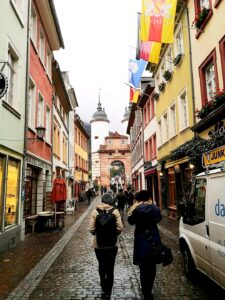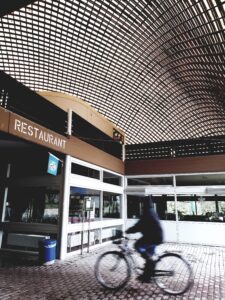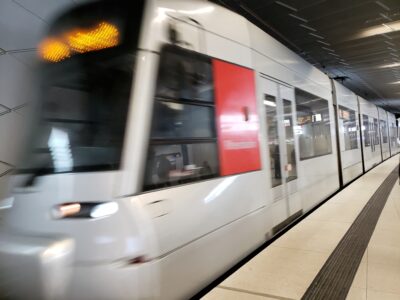
American Council on Germany Sustainable Urban Development Study Tour 2019 Participants, Old Town Mannheim, Germany
In early December 2019, I joined seven fellow Americans and eight Germans in touring Dusseldorf, Mannheim, and Heidelberg with the American Council on Germany’s Sustainable Urban Development Study Tour. We met with US diplomatic representatives, local elected and appointed officials, and regional experts on sustainable urban development.
The Michigan Municipal League has a tradition of connection with the American Council on Germany (ACG), a non-profit founded in the immediate post-World War II era. Two of my colleagues took part in a similar tour in the late 1990s. Both tours were an unparalleled opportunity to confer with professionals on both sides of the Atlantic working to improve their cities and the lives of their citizens.
My 2019-2020 group was comprised of not only planners and economic development professionals, but also an attorney with brownfield redevelopment expertise, a transportation journalist, the community relations director for Uber Germany, a landscape architect, and even a city councilperson who also serves as the chief of the local riot police. We covered more than 50 miles on foot through three cities and conducted more than 30 substantive meetings over the course of about six days. It was like drinking from a firehose while walking our way to international urban planning enlightenment. Here are my key observations from the first half of this program:
Trans-Atlantic Understanding Lives with Individual Connections
The implicit purpose of the ACG is to foster greater Trans-Atlantic understanding between nations. We experienced this principle firsthand while meeting with the US Counsel General, the Canadian Counsel General, the Executive Leadership of the Nordrhein-Westfalen Landstadt (state parliament), and cultural diplomatic representation from the AmerikaHaus. In seeing the work of this “North American Friendship Group,” it was heartening to see such strong, familial working relationships and collaborative diplomacy. In a similar vein, over the course of the week, our tight-knit group quickly found that the Germans’ responses to the Americans’ questions, and vice versa, brought forth even deeper discussions about the base assumptions of each democracy and the economic cultural norms which drive government policies.

American Council on Germany Sustainable Urban Development Study Tour 2019 Participants, Multihalle, Mannheim, Germany
Carbon Reduction is the Focus
Climate change is discussed in very real terms, and it directly relates to public dialogue about how German cities are taking steps to reduce carbon usage. If economic benefits can be achieved, great. But profit is not the driving goal. There are deep ideological differences between countries in how basic land use laws are structured, and therefore, how development occurs. In Germany, like in the US, consumer behavior changes are tied to local/state level regulations or financial incentives. A surprise in evaluating building systems and carbon reduction measures is that most existing buildings have already been reused and retrofitted for energy efficiency. The adaptive reuse presently being experienced by many US cities was de rigor in Germany more than a few decades ago, and because those methods have been so fully integrated into the common playbook for planners, it is no longer viewed as innovative. Historic buildings viable for reuse have long ago been absorbed by the markets.
Every Day We’re Hustling
At times, it felt like we were visiting a planners’ utopia. Despite that initial strong showing, the struggle to impart best practices for city building showed through at times in the fatigue which crept into practitioners’ voices when describing plans versus realities. All in all, planners in Germany are better funded, better equipped, but not better skilled. Their problems are simply different than ours. They want to accomplish the same kinds of dreams we forecast here in the US – with a more explicit urban eye. They have the benefit of many more tools for public policy and regulation, such as mandating 40% of all new housing units to fall into the workforce and affordable housing range of rent control or the ability to build out multi-modal transit systems, and yet they continue to look for ways to serve a growing population.
This tour showcased dozens of urban practitioners and elected leaders seeking to accomplish many of the same goals we seek to attain here in Michigan. We covered a broad swath of topics, several of which are related to the topics being discussed currently at the League. Sustainable urban development, with heavy focus on carbon reduction measures, transit systems, housing demand, capacity and focus of public education systems, cultural integration for equity and inclusion, and data tracking for incremental improvements.
This study tour is intense and inspiring, and we’re only halfway done. I returned home delighted to be reunited with my family and colleagues, with my mind still full of tremendous experiences. I can’t wait to share the US, when we tour two yet-to-be-announced American cities with our German colleagues during the second half of the program in Spring 2020!
Want to Apply next time around for this Study Tour with the American Council on Germany? Visit https://www.acgusa.org/study-tours more information.
